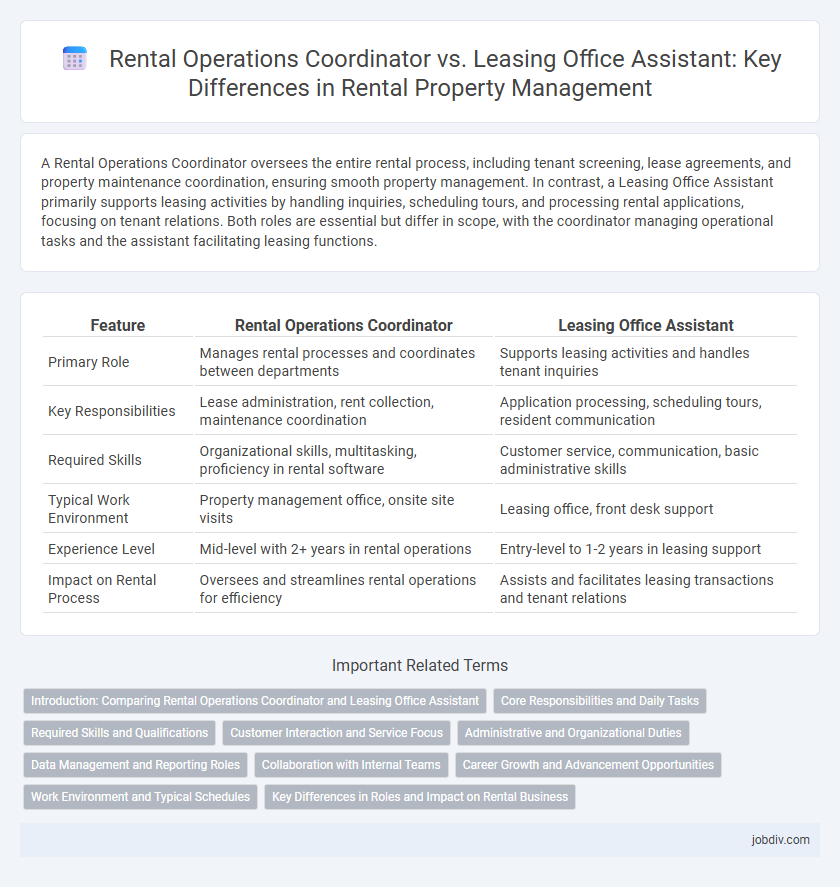A Rental Operations Coordinator oversees the entire rental process, including tenant screening, lease agreements, and property maintenance coordination, ensuring smooth property management. In contrast, a Leasing Office Assistant primarily supports leasing activities by handling inquiries, scheduling tours, and processing rental applications, focusing on tenant relations. Both roles are essential but differ in scope, with the coordinator managing operational tasks and the assistant facilitating leasing functions.
Table of Comparison
| Feature | Rental Operations Coordinator | Leasing Office Assistant |
|---|---|---|
| Primary Role | Manages rental processes and coordinates between departments | Supports leasing activities and handles tenant inquiries |
| Key Responsibilities | Lease administration, rent collection, maintenance coordination | Application processing, scheduling tours, resident communication |
| Required Skills | Organizational skills, multitasking, proficiency in rental software | Customer service, communication, basic administrative skills |
| Typical Work Environment | Property management office, onsite site visits | Leasing office, front desk support |
| Experience Level | Mid-level with 2+ years in rental operations | Entry-level to 1-2 years in leasing support |
| Impact on Rental Process | Oversees and streamlines rental operations for efficiency | Assists and facilitates leasing transactions and tenant relations |
Introduction: Comparing Rental Operations Coordinator and Leasing Office Assistant
Rental Operations Coordinators manage complex leasing processes, vendor relationships, and compliance documentation to ensure smooth property management operations. Leasing Office Assistants primarily handle tenant inquiries, application processing, and scheduling property tours, focusing on direct resident services. Understanding these roles highlights the distinction between strategic operational management and frontline tenant engagement in rental property administration.
Core Responsibilities and Daily Tasks
Rental Operations Coordinators oversee lease administration, tenant communications, and coordinate maintenance requests to ensure smooth property management. Leasing Office Assistants handle customer inquiries, schedule property tours, and assist with rental applications to support leasing processes. Both roles require strong organizational skills but the coordinator focuses more on operational logistics, while the assistant emphasizes frontline tenant interactions.
Required Skills and Qualifications
A Rental Operations Coordinator requires strong organizational skills, proficiency in property management software, and experience in contract administration to efficiently oversee rental processes. Leasing Office Assistants need excellent customer service abilities, basic knowledge of leasing laws, and strong communication skills to support tenant interactions and office tasks. Both roles benefit from attention to detail, multitasking capabilities, and familiarity with rental industry regulations.
Customer Interaction and Service Focus
Rental Operations Coordinators manage tenant relations by addressing complex issues, coordinating maintenance requests, and ensuring lease compliance, emphasizing proactive problem resolution and customer satisfaction. Leasing Office Assistants primarily handle front-desk responsibilities, such as greeting clients, processing applications, and providing property information, focusing on efficient daily customer service. Both roles require strong communication skills, but coordinators engage in deeper operational tasks while assistants facilitate initial leasing interactions.
Administrative and Organizational Duties
Rental Operations Coordinators manage complex administrative tasks including rental applications, tenant communications, and lease documentation while coordinating property maintenance schedules. Leasing Office Assistants primarily handle front-desk responsibilities such as processing applications, answering inquiries, and maintaining accurate leasing records. Both roles require strong organizational skills, but Coordinators typically oversee broader operational workflows and vendor interactions.
Data Management and Reporting Roles
Rental Operations Coordinators specialize in overseeing comprehensive data management systems, ensuring accurate tracking of rental transactions, tenant records, and lease agreements. Leasing Office Assistants primarily handle data entry tasks, updating tenant information and preparing routine reports to support daily office functions. Both roles contribute to reporting accuracy, with Coordinators focusing on analytical insights and Assistants maintaining data integrity.
Collaboration with Internal Teams
A Rental Operations Coordinator enhances collaboration by managing communication between maintenance, leasing, and property management teams to streamline property turnover and resident satisfaction. Leasing Office Assistants support internal coordination primarily by assisting leasing agents with scheduling, documentation, and resident inquiries, ensuring smooth office operations. Both roles require effective teamwork to maintain cohesive rental processes and optimize tenant experiences.
Career Growth and Advancement Opportunities
Rental Operations Coordinators typically oversee property management workflows, offering broader responsibilities and exposure to key operational functions that accelerate career growth into management roles. Leasing Office Assistants primarily focus on tenant interactions and administrative support, providing foundational experience but with more limited advancement opportunities within leasing or property management hierarchies. Progression from Leasing Office Assistant to Rental Operations Coordinator can serve as a critical step towards leadership positions in real estate and rental operations.
Work Environment and Typical Schedules
Rental Operations Coordinators typically work in dynamic office settings within property management companies, often handling multiple sites and coordinating various rental tasks during standard business hours, 9 AM to 5 PM. Leasing Office Assistants usually operate in a quieter leasing office environment, with schedules that may extend into evenings or weekends to accommodate prospective tenant showings and application processing. Both roles demand strong organizational skills, but the Leasing Office Assistant position often involves more direct tenant interaction during flexible or non-traditional hours.
Key Differences in Roles and Impact on Rental Business
Rental Operations Coordinators oversee the entire rental process from tenant screening to lease management, ensuring smooth property operations and compliance with regulations. Leasing Office Assistants primarily handle administrative tasks such as scheduling viewings, processing applications, and maintaining tenant records, supporting leasing teams in daily workflow. The coordinator's strategic role directly impacts tenant retention and operational efficiency, whereas the assistant's role enhances customer service and lease processing speed.
Rental Operations Coordinator vs Leasing Office Assistant Infographic

 jobdiv.com
jobdiv.com